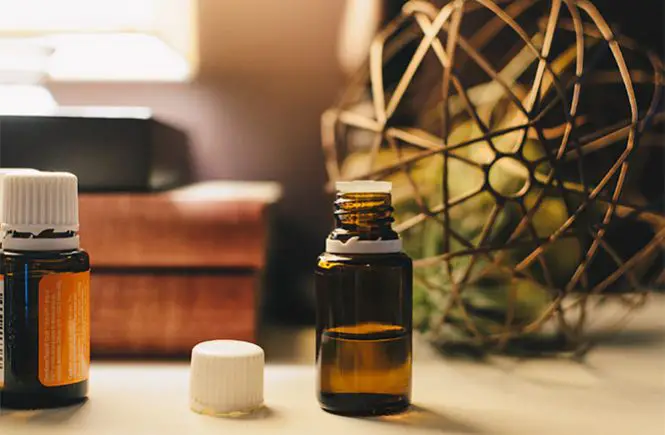Most of us have faced pain at some point, from a muscle twinge to a throbbing headache. Instead of automatically opting for over-the-counter pills, have you considered natural essential oils?
In this guide, we will explore the benefits of these natural wonders and how they can be a viable substitute to regular pain medications. Let’s get started!
White Camphor Essential Oil Alleviate muscle discomfort with the rejuvenating aroma of white camphor essential oil. This is the only variety safe for use in aromatherapy and cosmetics. Extracted from camphor trees, this oil boasts anti-inflammatory and analgesic attributes that decrease inflammation and boost blood flow, encouraging quicker recovery.
Notably, white camphor oil provides an initial cooling sensation, which then transitions to warmth upon skin contact. Research involving nine participants indicated that this unique feeling, combined with better blood flow, renders white camphor oil an effective natural remedy for pain.
For pain alleviation, blend the oil with a base oil such as coconut or almond before applying. An ideal mix is 3 drops of camphor oil for every teaspoon of the base oil. You can also add it to a bath or diffuse for added benefits.
Eucalyptus Oil Eucalyptus oil is a refreshing solution offering significant healing properties. Its primary component, eucalyptol, has strong anti-inflammatory and pain-relieving benefits suitable for headaches to muscle strain. It’s a wonderful addition to your daily health routine!
Research has highlighted eucalyptus’s healing potency. Its inhalation notably diminished pain and blood pressure in participants, outdoing traditional placebo methods. For those scouting natural pain solutions, eucalyptus is worth a shot.
For topical application, mix with a carrier oil (3-5 drops to a teaspoon) and rub onto affected regions for maximum relief and relaxation.
Lemongrass Essential Oil Renowned for its zesty scent, lemongrass oil is an excellent ally against various discomforts. Extracted from the lemongrass plant, its components like geraniol and citral possess anti-inflammatory properties, aiding in muscle, joint, and headache relief.
A Journal of Pharmaceutical Science & Research article revealed that daily lemongrass oil application mildly alleviated arthritic pain in participants over a month – a boon for seniors seeking natural remedies.
Always blend lemongrass oil with a base oil before using. For headache relief, rub the mixture onto your temples and inhale deeply.
Bergamot Essential Oil Bergamot oil, recognized for its uplifting aroma, is a favored aromatherapy choice. Its properties offer significant pain relief, as validated by numerous studies.
You can inhale or apply it after diluting with a base oil to counter inflammation, calm your mind, and ease muscle, headache, and nerve discomfort.
To swiftly combat headaches or sinus issues, diffuse several drops or prepare a steam inhalation treatment using hot water and this fragrant oil.
Clove Essential Oil Extracted from clove tree buds, clove oil emits a warm, spicy aroma. Its standout feature is its pain-relieving potential, attributed to eugenol, which eases inflammation and offers a numbing effect.
This remarkable oil can offer relief from toothaches, joint discomfort, muscle pain, and headaches through massage or aromatic use.
To promptly relieve tooth pain, mix a few clove oil drops with a teaspoon of olive oil, dab onto a cotton swab, and place on the painful spot. The relief generally lasts 2-3 hours. Reapply as needed but avoid ingestion to prevent potential side effects.
Essential Oil Usage Guidelines Dilution of Oils: Always dilute essential oils with a carrier oil before skin application. Typically, 3-5 drops per teaspoon of carrier oil is recommended.
Skin Testing: Prior to broad application, test a tiny amount on a small skin patch. After 24 hours, examine for signs like redness or irritation, which could signify allergies.
Potential Risks and Precautions:
- Some oils, such as bergamot, have components like linalool that might irritate certain individuals. Always conduct a patch test.
- Pregnancy: Pregnant individuals should be cautious, as oils like lemongrass or clove might be unsuitable. Always consult a healthcare expert first.
- Kids’ Safety: Certain oils may not be suitable for kids, especially those below 2. Always consult with a pediatrician or an aromatherapist.
Additional Guidelines:
- Store in a cool, shaded area.
- Keep away from kids and pets.
- Avoid eye and mucous membrane contact.
- If you have medical conditions or are on medication, consult a professional before use, as some oils might conflict with medicines or aggravate health issues.
- Discontinue use and see a doctor if any adverse reactions occur.

